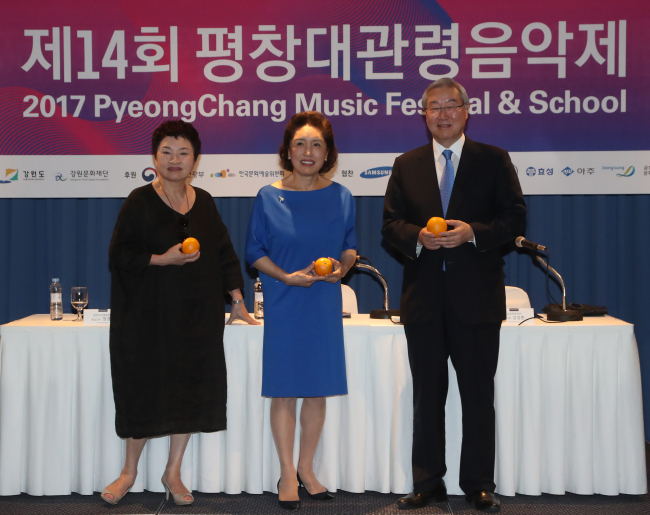Initially conceived as a way to promote PyeongChang’s bid to host the Winter Olympics, the PyeongChang Music Festival and School has come a long way.
When violinist Kang Hyo, a professor at the Juilliard School in New York, launched the summer classical music festival and school in 2004 in the mountains of Gangwon Province, it was called the Daegwallyeong Music Festival and School, or the Great Mountains Music Festival and School in English.
Modeled after the Aspen Music Festival in Colorado, US, it was envisioned as a chamber music festival, a tradition that has been maintained by its artistic directors, cellist Chung Myung-wha and violinist Chung Kyung-wha, who took the helm in 2011.
“With the PyeongChang Olympics taking place next February, the upcoming PyeongChang Music Festival and School is a special one,” said Chung Myung-wha at a press conference held in Seoul last week to unveil this year’s program.
 |
PyeongChang Music Festival and School artistic directors Chung Kyung-wha, Chung Myung-wha and Gangwon Art & Culture Foundation chief Kim Sung-hwan attend a press conference held at the Grand Ambassador Seoul on June 20. (Yonhap) |
The winter edition of the festival will not be held this year in PyeongChang, as the main concert venue at Alpensia Resort will not be available close to the period of the Winter Games. Instead, it will be held in Seoul and Gangneung, a site of several Winter Games events. In November, the festival will travel abroad to Washington, New York City, Dresden and Vienna for special concerts, helping to build up the momentum for the upcoming Olympics.
Themed “Great Russian Masters,” there will be a heavy presence of Russian music at this year’s festival, which runs from July 18 to Aug. 8, both in terms of music and performers. Music by popular composers Tchaikovsky and Rachmaninoff will be joined by the more unfamiliar music of Arensky, Taneyev and Popper, among others.
The highlight of the festival is the St. Petersburg-based Mariinsky Opera Company’s performance of the concert version of “The Love for Three Oranges,” a comic opera by Sergei Prokofiev, which gets its Korean premiere at PyeongChang on July 29. Conductor Zauerbek Gugkaev will lead the Mariinsky Orchestra and the National Chorus of Korea will join the singers from Mariinsky,
A more robustly Russian program is prepared for July 30 when 16 Mariinsky singers, the National Chorus of Korea and the Mariinsky Orchestra present highlights of Russian operas, folk music and the rarely heard “Moscow Cantata” by Tchaikovsky, which is in keeping with the festival’s tradition of performing an oratorio each season.
Also to lend muscle at PyeongChang is Russia’s leading string quartet, the Borodin Quartet, which will perform well-known string quartets of Haydn and Shostakovich on July 27, July 29 and Aug. 3.
Over the years, the PyeongChang Music Festival and School has grown into a unique chamber music festival and a prestigious music school that boasts today’s top talents among its alumni, many of whom return as festival participants, such as cellist Koh Bong-ihn and violinist Shin Zia. But at its heart still lies the mission of promoting the PyeongChang Olympics.
PyeongChang Music Festival and School will hold two special concerts, titled “Korea, China, Japan Concert,” marking the upcoming Winter Games as well as the 2022 Beijing Winter Olympics and the 2020 Tokyo Summer Olympics.
The opening concert of the festival on July 26 and the concert on July 28 will feature musicians from Korea -- violinist Chung Kyung-wha, pianists Son Yeol-eum and Kim Da-sol, among others -- as well as cellist Jiang Wang and violist Hung-Wei Huang from China, and violinist Mayu Kishima and double bassist Michinori Bunya from Japan.
This year’s festival will introduce three commissioned pieces: Korean composer Kim Texu’s piece that celebrates the PyeongChang Winter Olympics will have its world premiere at the festival; French composer Jean-Paul Pennin’s piano piece for four hands, “Pushkin Cafe,” which is described as being very Russian; and “Sextet” by American composer William Bolcom that was jointly commissioned with the Santa Fe Chamber Music Festival and Chamber Music Northwest Festival.
While the main venues of the festival are located at Alpensia Resort, participating musicians will perform in cities throughout the mountainous province, including violinist Chung Kyung-wha who will perform at a cathedral in Hwenggye on Aug. 7.
As for the future of the PyeongChang Music Festival after the Olympics, things remain uncertain. Talks aimed at continuing the festival are under way with the Gangwon Provincial Government, according to Kim Sung-hwan, head of Gangwon Arts and Culture Foundation, which, along with Gangwon Province, hosts the festival.
“Although its beginning was associated with the PyeongChang Olympics, it has now become a festival that artists around the world want to come to,” said Chung Myung-wha, adding, “I hope this festival can continue for the next several decades, no matter what.”
By Kim Hoo-ran
(
khooran@heraldcorp.com)








